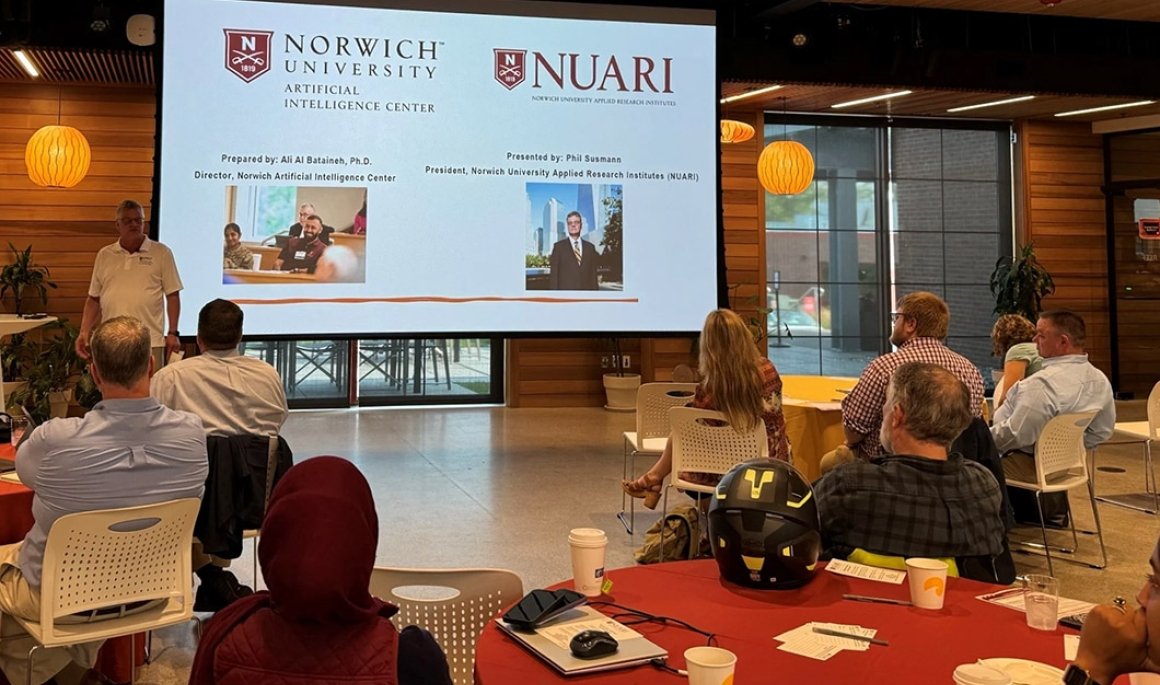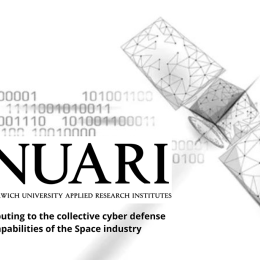Exploring the Intersection of Artificial Intelligence and Data Science

Exploring the Intersection of Artificial Intelligence and Data Science: Norwich University and NUARI's Colloquium on Collaboration and Innovation
On August 14, Norwich University and Norwich University Applied Research Institutes (NUARI) co-hosted a groundbreaking colloquium, "Exploring the Intersection of Artificial Intelligence and Data Science: A Colloquium on Collaboration and Innovation in Government and Industry." This one-day event, held at HULA Lakeside in Burlington, VT., catalyzed exploring the expanding AI endeavors of NUARI and Norwich University, sparking curiosity and engagement in the field. By showcasing four pioneering testbeds and expert panel discussions, the colloquium underscored the institutions' dedication to advancing AI research and its practical applications, fostering a collaborative environment where innovation and knowledge-sharing thrive.
As Norwich University and NUARI embarked on their second year of pioneering experiential education and AI testbed initiatives, the institution's commitment to innovation and hands-on learning was further solidified through the dual participation and leadership of both the university and NUARI. This collaborative effort underscored the university's dedication to pushing the boundaries of academic excellence and positioned Norwich and NUARI at the forefront of cutting-edge research and real-world application.
The day kicked off with opening remarks and perspectives delivered by Norwich University's new President, LtGen Broadmeadow '83, USMC (Ret.); Phil Susmann, President, NUARI; and Michael Battig, PhD, Professor and Director of the Leahy School of Cyber Security & Advanced Computing, Norwich University.
The colloquium showcased a diverse array of innovative testbeds, presented by NUARI researchers and Norwich faculty, demonstrating the cutting-edge applications of AI in various fields. These testbeds included the development of a serial murder database, leveraging AI to provide comprehensive, accurate, and centralized data on serial and mass murderers; critical discourse analysis and behavioral framing, using machine learning to understand human behavior; AI-optimized EV charging, optimizing energy consumption and reducing strain on the electrical grid; and predicting sepsis onset in critical care patients, harnessing AI to improve healthcare outcomes and save lives. These testbeds not only highlighted the technical expertise of the presenters but also underscored the potential of AI to drive meaningful impact in fields ranging from public safety and social science to sustainability and healthcare.
Rounding out the morning sessions, Vermont's Attorney General, Charity Clark, delivered a compelling keynote address, highlighting the critical issue of data privacy in the era of rapid AI expansion. With her unique blend of legal expertise and passion for social justice, Attorney General Clark drew attention to the importance of responsible data handling, highlighting the potential risks and consequences of unchecked AI growth on individual privacy and societal well-being.
The schedule of presentations and panels was structured to allow participants and the gathered audience time to discuss and expand on information through a series of networking and conversation breaks between the sessions.
The colloquium also featured a series of expert panels that delved into the most pressing topics at the intersection of AI and society. The first panel explored the latest advancements in AI techniques, discussing the breakthroughs and challenges in machine learning and natural language processing, the importance of AI model explainability by designers, and the advantages of including subject matter experts in designing AI models. The second panel examined the critical relationship between AI and cybersecurity, highlighting how AI can strengthen cyber defenses and, unfortunately, be exploited by criminal actors. The third panel focused on AI's transformative impact on 21st-century commerce, including finance, advanced manufacturing, tourism, and customer experience applications. Through these panels, attendees gained a deeper understanding of AI's far-reaching implications and its opportunities for innovation and growth.
The colloquium was honored to welcome distinguished guest Vermont Senator Patrick Leahy (Retired), who delivered insightful afternoon remarks that brought the event to a thought-provoking close. Drawing on his esteemed experience, Senator Leahy emphasized the crucial need for strategic thinking when advancing in AI and machine learning, highlighting Norwich University and NUARI's pioneering work in cybersecurity as a shining example. His words served as a timely reminder that navigating the complexities of emerging technologies requires technical expertise, forward-thinking vision, and collaboration.
The AI Colloquium was a resounding success in achieving its objectives of knowledge dissemination and fostering interest in AI endeavors.
The heart of Norwich's AI Center's mission is a steadfast commitment to responsible and ethical AI development, recognizing the profound impact of artificial intelligence on society. With a multifaceted approach, the Center aims to advance the field through rigorous research, educating the next generation of leaders through specialized programming. By addressing the growing national and regional needs for advanced computing expertise, the AI Center seeks to ensure that the benefits of AI are equitably distributed and its applications aligned with human values, paving the way for a future where technology serves the greater good.
Read More

The Importance of Collaboration: Tackling Cybersecurity Challenges in the Space Industry
The Evolving Threat Landscape- NUARI's Engagement with Space ISAC As the only space-dedicated Information Sharing and Analysis Center (ISAC), Space ISAC plays a critical role in collecting, analyzing...

Timeless Vigilance: NUARI's Enduring Legacy in Countering Emerging Threats
The United States faces an evolving array of threats to its national security as adversaries increasingly exploit the cyber domain and information environment to undermine American interests and...

How to Become a CISO: Path Toward a Career in Cybersecurity
In today’s digital age, cybersecurity is crucial for protecting intellectual and personal information, leading to a high demand for skilled professionals. Those with a tech background and a passion...
